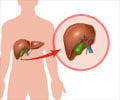Fibrosis is a scarring condition that is characterized by excessive collagen production that impedes normal cell function and can cause organ dysfunction and failure.
Fibrosis is a scarring condition that is characterized by excessive collagen production that impedes normal cell function and can cause organ dysfunction and failure. Evidence from several studies suggests that connective tissue growth factor (CCN2) plays a central role in fibrotic conditions in many organ systems..
A hallmark of fibrosing injury in the liver is the activation of hepatic stellate cells (HSCs) which become highly proliferative, synthesize increased levels of transforming growth factor (TGF)-β and CCN2, and produce excessive amounts of collagen. Previous studies have not investigated the effect of CCN2 antagonism in HSCs of human origin.A research team led by Dr. David Brigstock addresses this question. Their work will be published on August 14, 2009 in World Journal of Gastroenterology.
By designing a novel antisense inhibitor that blocked CCN2 mRNA transcription and protein production, the investigators showed that in activated human HSCs, basal or TGF-β1-induced transcription and production of collagen I could be reduced, and the ability of the cells to actively divide was curtailed. The innovative features of this study involve the use of human HSCs and the delivery of the antisense molecule in the form of a hammerhead ribozyme, which has a more efficient blocking action than some other conventional antisense methods. The data show that the anti-fibrotic properties of CCN2 hammerhead ribozyme are to the result of a reduction of collagen production and cell proliferation.
The results suggest that CCN2 hammerhead ribozyme has utility as a therapeutic agent for treating hepatic fibrosis in vitro. This is important as therapy for liver fibrosis is currently lacking despite the fact that millions of individuals around the world suffer from liver fibrosis caused by hepatitis, alcohol consumption, and other types of chronic liver injury.
Source-Eurekalert
RAS
 MEDINDIA
MEDINDIA




 Email
Email




